The product recommendations in this post are recommendations by the writer and/or expert(s)
interviewed and do not contain affiliate links. Meaning: If you use these links to buy
something, we will not earn a commission.
Mayo, traditionally made from a combination of oil, eggs, and vinegar or lemon juice, can be considered unhealthy due to its high fat and calorie content. The main concern lies in the type of fat used, typically a type of vegetable oil, which is often high in omega-6 fatty acids. Additionally, mayo can also contain added sugars, preservatives, and artificial ingredients, which can contribute to a less nutritious profile. Eating mayo in moderation and choosing healthier mayonnaise brands can help mitigate these concerns.
Consider these nutrition facts when choosing the best mayonnaise brands:
- Portion size: A typical serving of mayo is one tablespoon. In the grand scheme of a healthy diet, you can include mayonnaise as long as you focus on a variety of fats for fuel, and don’t over-do the portions.
- Type of oil: Traditional mayonnaise is made with vegetable oils that are rich in omega-6 fats. While omega-6 fatty acids are essential in moderation, an imbalanced ratio of omega-6 to omega-3 fatty acids in the diet has been linked to inflammation and various health issues. However, some of the “healthified” products on the market are made with olive oil or avocado oil for a heart health boost.
- Additives: Added sodium and added sugar can lower the quality of the mayo and add unnecessary calories and salt to your diet.
We’ve tapped into the expertise of dietitians to bring you the ultimate guide to the best (and worst) mayonnaise brands. Whether you’re a devoted mayo enthusiast or simply seeking healthier alternatives, our comprehensive guide will steer you toward the healthiest and unhealthiest mayo brands you can find.
Get ready to spread the truth about mayonnaise and take your condiment game to a whole new level of deliciousness while keeping your health in mind.
Best Mayo Brands
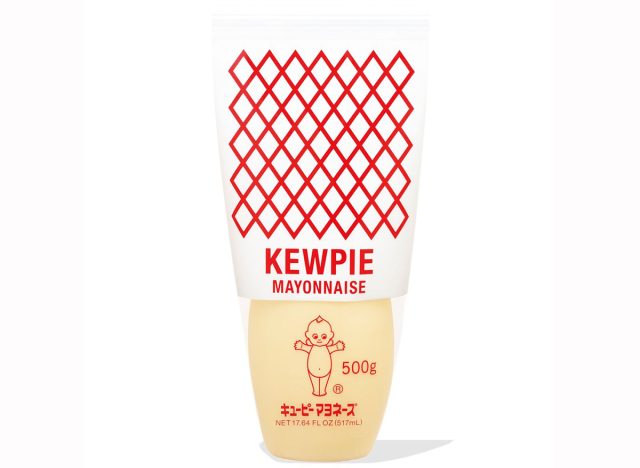

PER SERVING (1 TBSP): 100 cal, 11 g fat (1.5 g saturated fat), 25 mg cholesterol, 105 mg sodium, 0 g sugar, 0 g protein
Kewpie mayonnaise is having a moment on TikTok due to its rich, umami flavor from using only egg yolks—distinct from other brands that use the whole egg. Alongside egg yolk, Kewpie mayo embraces simplicity by relying on oil and vinegar as its primary ingredients. Any additional components are kept to a minimum, reflecting the brand’s commitment to minimalism.
Notably, Kewpie prides itself on its remarkably low sodium content compared to other mayo options available in the market. For the ultimate Kewpie experience, look for the original Japanese version packaged in a bag, rather than the American option found in a bottle.
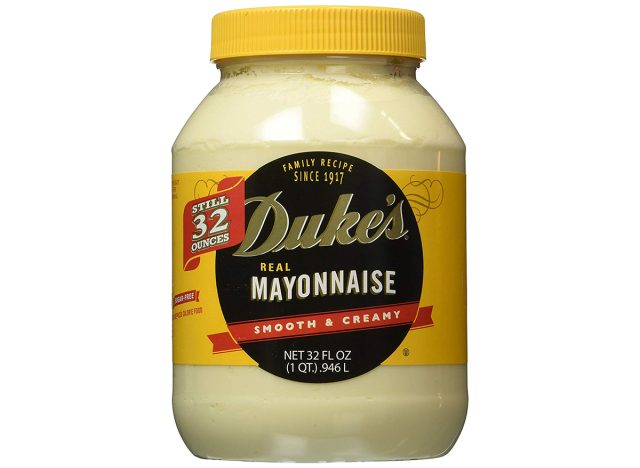

PER SERVING (1 TBSP): 100 cal, 12 g fat 10g (2 g saturated fat), 10 mg cholesterol, 70 mg sodium, 0 g sugar, 0 g protein
Duke’s distinct and genuine taste stems from its century-old family recipe, incorporating solely egg yolks, apple cider vinegar, soybean oil, and a hint of paprika. This combination results in a velvety, homemade-like texture that is both smooth and creamy. Notably, Duke’s stands out from other leading mayonnaise brands, as it is the only one that is entirely sugar-free.
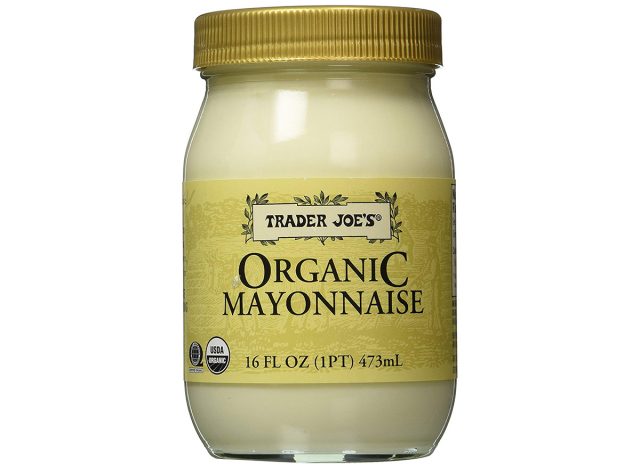

PER SERVING (1 TBSP): 100 cal, 11 g fat 10g (1.5 g saturated fat), 10 mg cholesterol, 80 mg sodium, 0 g sugar, 0 g protein
“My kids love Trader Joe’s Organic Mayonnaise because the flavor is amazing and the texture works brilliantly in sandwiches, salads, and casseroles. As a pediatric dietitian, I’m a huge fan of the fact that it contains no added sugar and is made with organic, wholesome ingredients,” says Malina Malkani, MS, RDN, CDN.
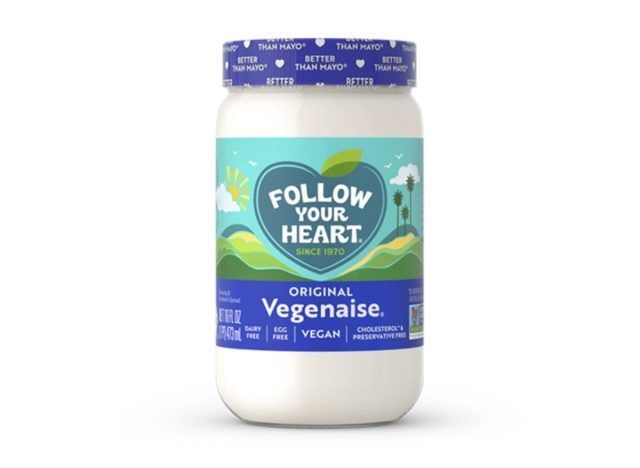

PER SERVING (1 TBSP): 80 cal, 9 g fat 10g (0.5 g saturated fat), 0 mg cholesterol, 80 mg sodium, 0 g sugar, 0 g protein
Jessie Hulsey, RD shares her take: “Follow Your Heart Original Vegenaise is made from plant-based ingredients and offers a fantastic option for individuals who follow a vegan or vegetarian lifestyle. It is free from eggs, dairy, and other animal products, making it suitable for those with allergies or ethical dietary choices. One of the notable features of this mayo brand is its use of expeller-pressed canola oil, a heart-healthy oil. Canola oil is a good source of monounsaturated fats and omega-3 fatty acids, which are known to have positive effects on heart health and overall well-being.”
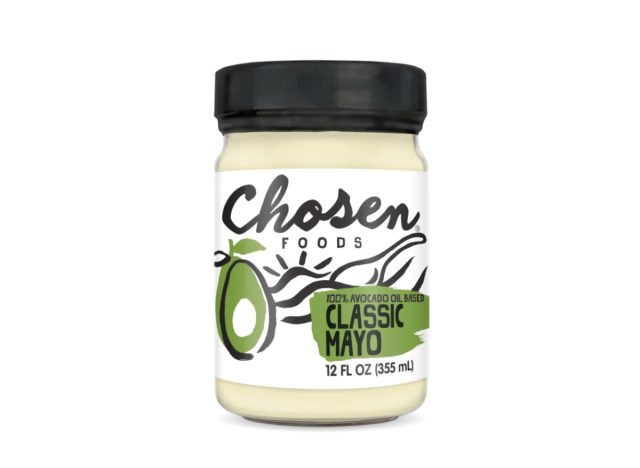

PER SERVING (1 TBSP): 100 cal, 11 g fat 10g (1.5 g saturated fat), 15 mg cholesterol, 50 mg sodium, 0 g sugar, 0 g protein
Chosen Foods’ Classic Avocado Oil mayo is an excellent choice for heart health. Though we don’t have as much data on avocado oil versus avocados themselves, some research shows that increasing your avocado consumption is associated with lower cardiovascular disease risk. Chosen Foods’ high price point makes it a splurge, but if you don’t use a lot of mayo, a jar may be worth the cost, says Sarah Garone, NDTR of A Love Letter to Food.
READ RELATED: Nutritionist Anjali Mukerjee Shares Tips On Ways To Prevent Memory Loss
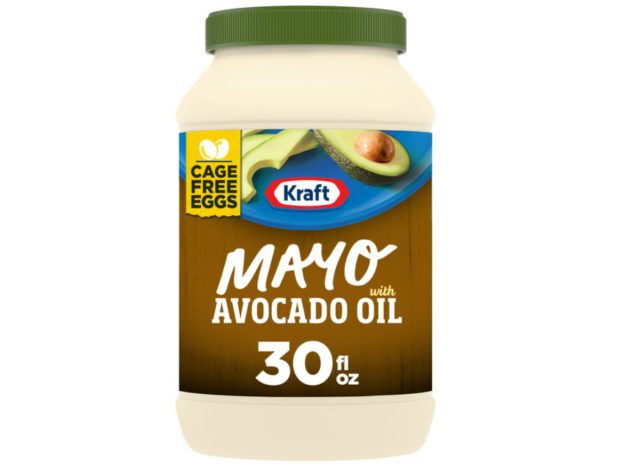

PER SERVING (1 TBSP): 45 cal, 4.5 g fat 10g (0 g saturated fat), 10 mg cholesterol, 100 mg sodium, 0 g sugar, 0 g protein
“I love Kraft Avocado Oil Mayonnaise. It is affordable, widely available, sometimes comes in a squeeze bottle for people with mobility struggles, and tastes delicious. In terms of nutrition, it has half the fat of regular mayonnaise and contains over 200 milligrams of omega-3 ALA per serving,” says Alexandria Hardy, RDN LDN.
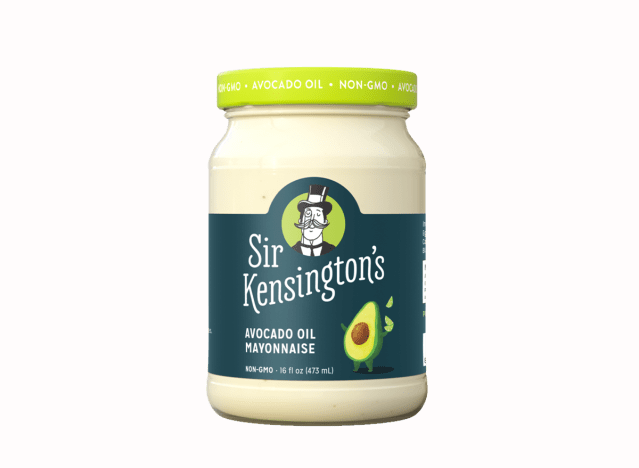

PER SERVING (1 TBSP): 100 cal, 10 g fat 10g (1 g saturated fat), 10 mg cholesterol, 95 mg sodium, 0 g sugar
“Sir Kensington’s Avocado Oil Mayonnaise is often considered a healthier choice compared to traditional mayonnaise due to its use of avocado oil as the primary ingredient. Avocado oil is rich in monounsaturated fats, which have been linked to improved heart health by lowering bad cholesterol levels and increasing good cholesterol levels,” says Wan Na Chun, MPH, RD, CPT.
“Additionally, avocado oil contains omega-3 fatty acid—essential fats known for their anti-inflammatory properties and potential benefits for brain and heart health. It tends to have a lower saturated fat content than regular mayonnaise, further supporting heart health,” Cun adds.
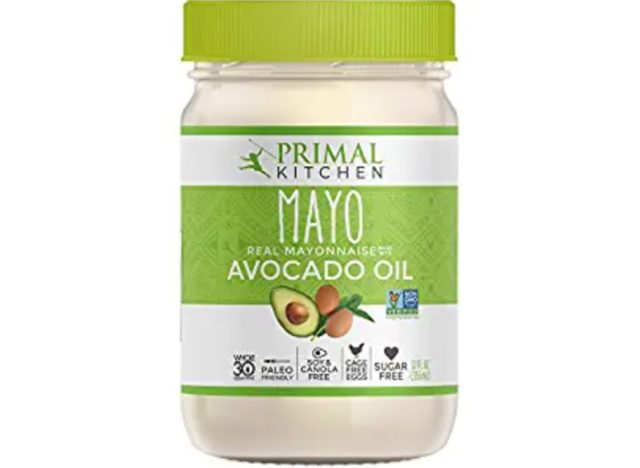

PER SERVING (1 TBSP): 100 calories, 12 g fat (1.5 g saturated fat, 0 g trans fat), 125 mg sodium, 0 g carbs (0 fiber, 0 sugar), 0 g protein
“Primal Kitchen Mayo with Avocado Oil is a rich and creamy mayonnaise that’s loaded with heart-healthy fats. Made with avocado oil, one serving has 8 grams of monounsaturated fat and only 1.5 g of saturated fat. Cutting down on saturated fat can reduce the risk of heart disease, and research has also found that replacing saturated fat with monounsaturated fat can reduce the risk of heart disease and type 2 diabetes,” says Kelsey Kunik, RDN at Graciously Nourished.
Worst Mayo Brands
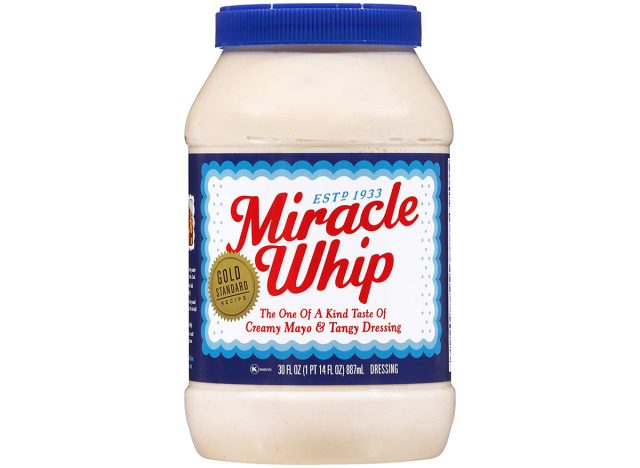

PER SERVING (1 TBSP): 40 cal, 3.5 g fat 10g (0.5 g saturated fat), 10 mg cholesterol, 95 mg sodium, 1 g sugar, 0 g protein
Miracle Whip is often considered less healthy compared to other mayonnaise options for several reasons. Miracle Whip contains fewer healthy fats compared to traditional mayonnaise, as it often includes more soybean oil and water instead of beneficial monounsaturated and polyunsaturated fats. The sodium levels in Miracle Whip are also typically higher, which can contribute to elevated blood pressure and an increased risk of heart disease,” says Chun.
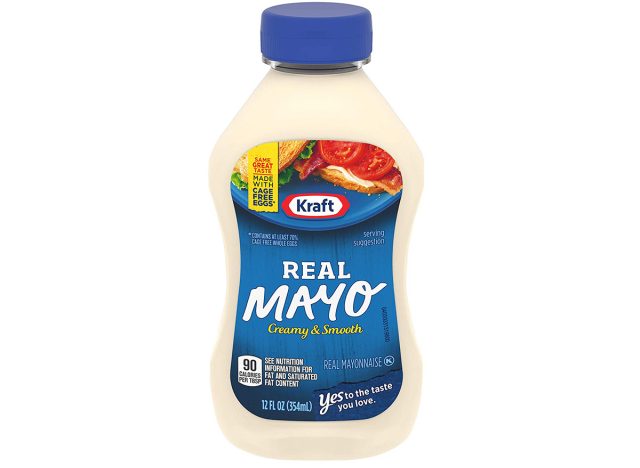

PER SERVING (1 TBSP): 90 cal, 10 g fat (1.5 g saturated fat), 5 mg cholesterol, 70 mg sodium, 0 g sugar, 0 g protein
Hulsey shares her insight on another mayo brand: “Kraft Real Mayo raises concerns due to its primary ingredient, soybean oil. While soybean oil is a common cooking oil, it is not the healthiest option when consumed in large quantities or on a regular basis. Soybean oil is known for its high omega-6 fatty acid content, which can disrupt the balance of omega-3 to omega-6 ratio in our diets. An excessive intake of omega-6 fatty acids without adequate omega-3s can lead to inflammation and increase the risk of various chronic diseases, including cognitive health.”
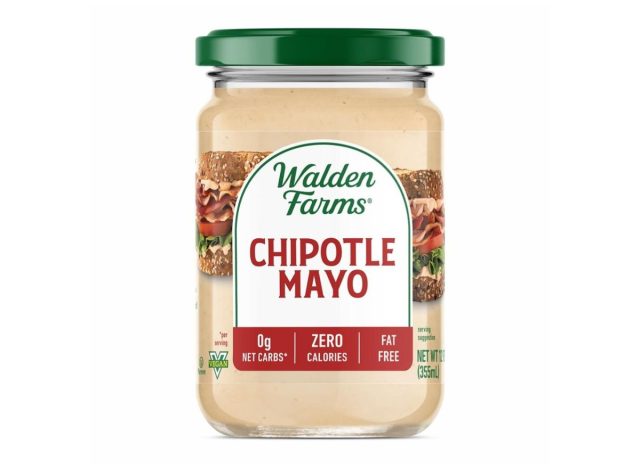

PER SERVING (1 TBSP): 0 cal, 0 g fat (0 g saturated fat), 115 mg sodium, 0 g sugar, 0 g protein
Walden Farms appears to be a healthier alternative to mayo, as they market their calorie-free and fat-free products to consumers looking out for healthier condiment alternatives. However, so often with products that claim to have zero calories, they are full of additives, chemicals, and extra ingredients to beef up the product in the absence of energy from oils. This Chipotle Mayo is no exception, as they use a combination of fibers, corn starch, and flavorings to create a pseudo-mayo experience.
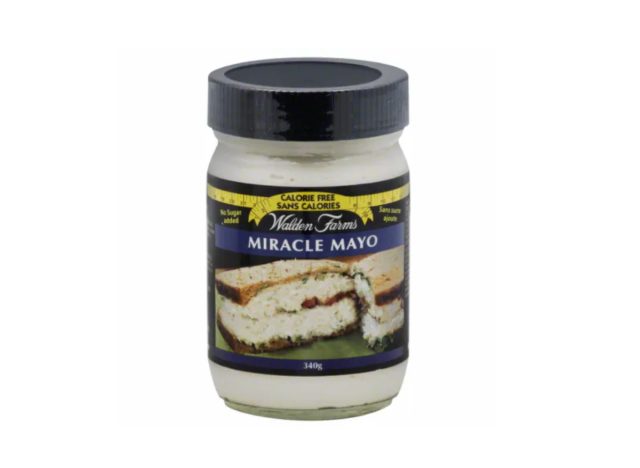

PER SERVING (1 TBSP): 0 cal, 0 g fat (0 g saturated fat), 0 mg cholesterol, 115 mg sodium, 0 g sugar, 0 g protein
Walden Farms Miracle Mayo markets itself as a calorie-free item, which may sound appealing to those seeking weight loss or a healthier option. However, it’s important to note that achieving a calorie and fat-free mayo-like product requires significant modifications to the traditional mayo recipe,explains Jessie Hulsey RD, an Atlanta-based registered dietitian.
In this case, the manufacturer has replaced the standard ingredients with artificial additives, thickeners, and sweeteners. While it’s true that Walden Farms Miracle Mayo can offer a lower-calorie option compared to traditional mayo, it’s important to consider the overall nutritional value. The absence of fat in this product means that it lacks the beneficial nutrients found in healthy fats, such as omega-3 fatty acids, which are essential for our overall well-being, Hulsey adds.










